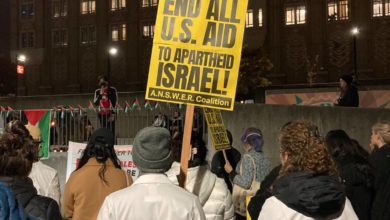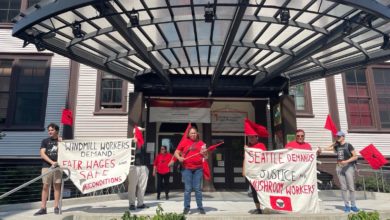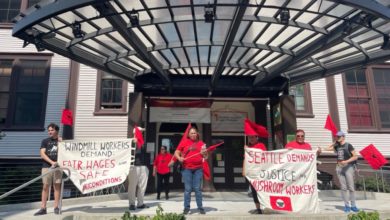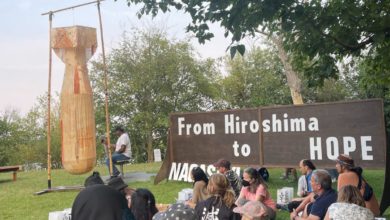There are nearly 450 homes in the Bow Lake 55+ Residential Community, in SeaTac, Washington. Residents live in mobile and manufactured homes, which they own, while paying rent to the Park management for the land their homes sit on. Many residents are retired or disabled, living on a low monthly fixed income. In spite of this, the park’s management company, First Commercial, has been raising rent by increasing amounts each year, and some individuals report their rent has even been raised multiple times within a year.
On December 15, the Bow Lake residents held a town hall meeting to discuss this struggle and come up with ideas to move forward. The meeting was well-attended, the room packed full of park residents as well as two SeaTac city council members, State representative Mia Gregersen and a representative from the office of Congressman Adam Smith, and Judith White from the Manufactured Home Owners of America-Washington State office.
Over the past few months, the Bow Lake Homeowner’s Association has been working with an ad-hoc committee of residents to put pressure on First Commercial to stop rent increases. In November, a letter was sent to First Commercial detailing these grievances and requesting a meeting to negotiate the rent. HOA president Mike Sanford read the response First Commercial mailed back: a page of nothing, almost an unedited template of a letter. They thanked the residents for voicing their opinions and said that the rental prices reflect the value of the park and improvements that have been made to the facilities. This assertion comes in direct conflict with the perspective of dozens of residents who have been regarding their treatment by First Commercial.
The meeting was full of residents standing up to tell their stories, many of them heartbreaking. One resident, Doris Anderson, spent two years without a working furnace in her home, and one year without a working stove, because she couldn’t afford to fix them.
Another resident has a carport that is falling apart. He asked management to come and fix it six months ago and nobody has shown up yet but they also have told him he is not allowed to fix it himself. His rent has also gone up $160 in the last three months. This individual shared that his wife is disabled, and he has to pay high medical bills.
Yet another resident spoke about her neighbor, who lives in one room of his house because he can’t pay for heat. Another resident pointed out that many of the “improvements” done to the park have been corporate upgrades, such as an “upgrade” to the landscaping of the small park near the lake, with no improvements to safety or other essential infrastructure.
Long term residents recall that their rents used to be in the range of $300/month and included water and sewerage. Now many are paying $700+ in addition to any mortgage they may be carrying on their home. This is unsustainable for residents living on Social Security or disability incomes of less than $1,000 a month. Many of these people believe they are facing imminent homelessness. Many speakers at the meeting were quick to point out that they couldn’t move if they wanted to: their homes don’t have resale value, they can’t afford to demolish them, and there is nowhere else they can afford to live. Some residents have limited mobility and would struggle to move even if there were affordable options, but for many, there are none.
For many years Bow Lake 55+ Residential Community was one of the most affordable places for seniors in King County. Now, some members of the community have developed a new opinion of the management company’s motives: a resident named Jude spoke and said, “It’s immoral, what they’re doing … the bottom line is greed.”
The politicians in attendance at the town hall meeting appeared to be sympathetic. Deputy Mayor of SeaTac Clyde Hill promised to take the community’s comments to city council and discuss it, and mentioned that he supports a housing bill being considered by the state legislature that might help with relocation as a last resort. State Rep. Mia Gregerson was enthusiastically supportive of the park residents, saying “Greed can’t be our number one value or priority.”
Quite a few residents raised concerns about zoning: the park is not zoned as a mobile home park, but as urban high density housing. Zoning matters because the way it is currently zoned means the park could be sold and converted to high density luxury apartment buildings and all the residents forced out. If rezoned as mobile/manufactured housing, then it has to remain that way. Rezoning would not address the issue of rent increases, but would provide a measure of security to many residents who have seen residents of a neighboring mobile/manufactured home park, The Firs, be forced out as their land has been sold to be turned into yet another hotel near the airport. Due to their struggle, the Firs residents have received an extended period of time to relocate; new bills being introduced in Olympia are intended to address protecting manufactured/mobile home communities from being redeveloped into less affordable housing options.
While Deputy Mayor Clyde Hill attempted to sound like he was sympathetic to the mostly white, older residents whose votes he no doubt hopes to to win next time he runs for office, he showed a different side when he talked about the recent sale of the SeaTac Center, a city owned property. This sale of city land to a developer means the displacement of many small businesses owned mainly by African immigrants. Hill tried to paint the sale as a positive, because the developer promises to build 380 units of “affordable housing.” Residents at the Town Hall started to murmur and shout, “Where are they supposed to go? What’s going to happen to those businesses?” Hill backed down but stuck around to talk to residents after the meeting. Also present was Council member Peter Kwon, who has supported both the small businesses and the residents at The Firs in their efforts to avoid displacement.
The meeting drew to a close with grim conclusions, but hopeful visions for the future and concrete next steps. First Commercial management has clearly and repeatedly demonstrated that they do not care about the people of Bow Lake; they do not have enough empathy to so much as arrange a meeting with the residents.
Even so, the members of the community have no intention of rolling over. In fact, the community has been inspired to band together and support each other more than ever before. Several residents volunteered to bring food to future meetings, even suggesting a weekly potluck to help support those who struggle to afford food. Many residents advocated packing the next city council meeting, and putting pressure on city council to rezone the land. Another resident suggested setting up a tent city outside the First Commercial office in downtown Seattle. Yet another suggested a rent strike. The HOA and the ad-hoc committee that have been working on this struggle will continue to meet, to synthesize ideas, and to fight. Ad hoc committee organizer and Bow Lake resident Jane Cutter had hopeful words for the crowd: “In our unity we have strength.”
Mike Kidd, another member of the ad hoc committee, who emceed the meeting, summed up the fighting spirit palpable in the room: “If we can’t start working with our politicians, we’d better start working against them.”





